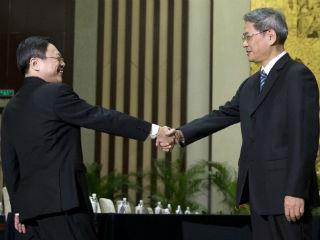Mainland China ("Peoples Republic of China") and Taiwan ("Republic of China") have held their highest-level and official talks since the end of the Chinese civil war in 1949.

On February 11 Wang Yu-chi, Taiwan’s Mainland Affairs Council Minister, and his Chinese counterpart, Zhang Zhijun, head of Taiwan Affairs Office Minister, met each other in the Chinese city of Nanjing. A symbolic place, Nanjing was the capital of the Republic of China when the nationalist Kuomintang of Chiang Kai-shek was in power. He and his government fled from there to Taiwan 65 years ago.
by
N. Peter Kramer
In 1949 the government of the Republic of China fled to the island Taiwan after losing the war to Mao Zedong’s communists. The milestone meeting comes four month after Xi Jinping, the Chinese President, said that neither side could continue ‘political disagreements forever’. According to Xinhua, the official Chinese news agency, Mr Xi said: ‘The two sides must reach a final solution step by step; these issues cannot be passed on from generation to generation’.
Previous cross-strait talks have been carried out through representatives of quasi-official organisations of both sides to avoid direct government contact. On February 11 Wang Yu-chi, Taiwan’s Mainland Affairs Council Minister, and his Chinese counterpart, Zhang Zhijun, head of Taiwan Affairs Office Minister, met each other in the Chinese city of Nanjing. A symbolic place, Nanjing was the capital of the Republic of China when the nationalist Kuomintang of Chiang Kai-shek was in power. He and his government fled from there to Taiwan 65 years ago.
Since then China has threatened to use force against Taiwan, which it regards as a renegade province. In 1995 and 1996 it fired missiles in the direction of Taiwan ahead of the first democratic presidential election on the island. Following the 2008 election of President Ma Ying-jeou, who favours closer ties with the mainland, Beijing has chosen for a more conciliatory approach. The two sides signed a landmark trade agreement the Economic Cooperation Framework Agreement that paved the way for stronger economic ties that have boosted trade and tourism. Last year cross-strait trade has doubled reaching an amount of US$197 billion and nearly 3 million Chinese traveled to Taiwan, following easing of restrictions on both sides.
Mr Zhang said at the end of the four days meeting in Nanjing ‘we should treasure this progress and work together to maintain and develop this positive momentum’. His ROC colleague Wang stressed that ‘before today’s meeting it was hard to imagine that cross-strait relations could get to this point’. Mr. Wang invited his Chinese counterpart to come to Taiwan. President Ma considered the meeting in Nanjing of historic significance; conducted under the principles of parity and dignity, the talks have great importance for the institutionalisation of interactions between two sides, he added.




 By: N. Peter Kramer
By: N. Peter Kramer
